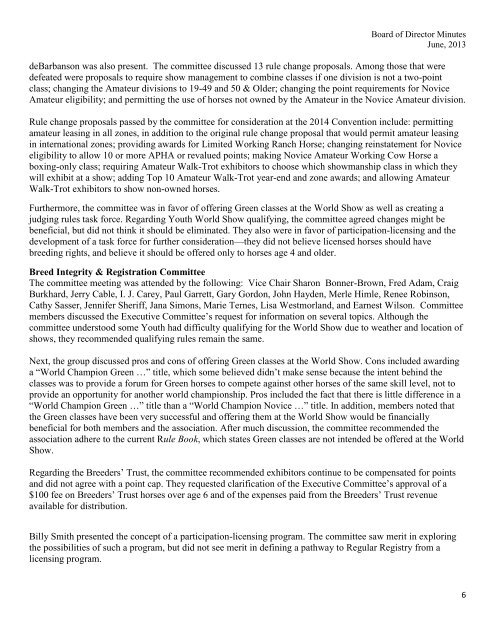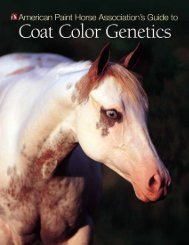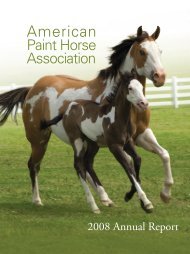AMERICAN PAINT HORSE ASSOCIATION BOARD OF ... - Press
AMERICAN PAINT HORSE ASSOCIATION BOARD OF ... - Press
AMERICAN PAINT HORSE ASSOCIATION BOARD OF ... - Press
Create successful ePaper yourself
Turn your PDF publications into a flip-book with our unique Google optimized e-Paper software.
Board of Director Minutes<br />
June, 2013<br />
deBarbanson was also present. The committee discussed 13 rule change proposals. Among those that were<br />
defeated were proposals to require show management to combine classes if one division is not a two-point<br />
class; changing the Amateur divisions to 19-49 and 50 & Older; changing the point requirements for Novice<br />
Amateur eligibility; and permitting the use of horses not owned by the Amateur in the Novice Amateur division.<br />
Rule change proposals passed by the committee for consideration at the 2014 Convention include: permitting<br />
amateur leasing in all zones, in addition to the original rule change proposal that would permit amateur leasing<br />
in international zones; providing awards for Limited Working Ranch Horse; changing reinstatement for Novice<br />
eligibility to allow 10 or more APHA or revalued points; making Novice Amateur Working Cow Horse a<br />
boxing-only class; requiring Amateur Walk-Trot exhibitors to choose which showmanship class in which they<br />
will exhibit at a show; adding Top 10 Amateur Walk-Trot year-end and zone awards; and allowing Amateur<br />
Walk-Trot exhibitors to show non-owned horses.<br />
Furthermore, the committee was in favor of offering Green classes at the World Show as well as creating a<br />
judging rules task force. Regarding Youth World Show qualifying, the committee agreed changes might be<br />
beneficial, but did not think it should be eliminated. They also were in favor of participation-licensing and the<br />
development of a task force for further consideration—they did not believe licensed horses should have<br />
breeding rights, and believe it should be offered only to horses age 4 and older.<br />
Breed Integrity & Registration Committee<br />
The committee meeting was attended by the following: Vice Chair Sharon Bonner-Brown, Fred Adam, Craig<br />
Burkhard, Jerry Cable, I. J. Carey, Paul Garrett, Gary Gordon, John Hayden, Merle Himle, Renee Robinson,<br />
Cathy Sasser, Jennifer Sheriff, Jana Simons, Marie Ternes, Lisa Westmorland, and Earnest Wilson. Committee<br />
members discussed the Executive Committee’s request for information on several topics. Although the<br />
committee understood some Youth had difficulty qualifying for the World Show due to weather and location of<br />
shows, they recommended qualifying rules remain the same.<br />
Next, the group discussed pros and cons of offering Green classes at the World Show. Cons included awarding<br />
a “World Champion Green …” title, which some believed didn’t make sense because the intent behind the<br />
classes was to provide a forum for Green horses to compete against other horses of the same skill level, not to<br />
provide an opportunity for another world championship. Pros included the fact that there is little difference in a<br />
“World Champion Green …” title than a “World Champion Novice …” title. In addition, members noted that<br />
the Green classes have been very successful and offering them at the World Show would be financially<br />
beneficial for both members and the association. After much discussion, the committee recommended the<br />
association adhere to the current Rule Book, which states Green classes are not intended be offered at the World<br />
Show.<br />
Regarding the Breeders’ Trust, the committee recommended exhibitors continue to be compensated for points<br />
and did not agree with a point cap. They requested clarification of the Executive Committee’s approval of a<br />
$100 fee on Breeders’ Trust horses over age 6 and of the expenses paid from the Breeders’ Trust revenue<br />
available for distribution.<br />
Billy Smith presented the concept of a participation-licensing program. The committee saw merit in exploring<br />
the possibilities of such a program, but did not see merit in defining a pathway to Regular Registry from a<br />
licensing program.<br />
6




